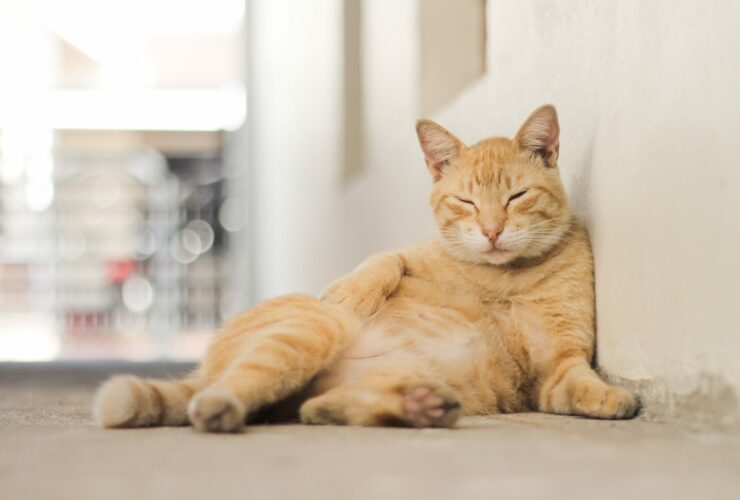10 Reasons Why My Cat is Meowing at Night & 10 Tips to Solve It
When it comes to feline companionship, understanding the nuances of cat behavior is essential. One common concern among cat owners is the persistent meowing at night, disrupting the cat parent’s sleep and the household harmony. In this comprehensive guide, we delve into the reasons behind nocturnal cat meowing and provide actionable strategies to effectively manage and curb this behavior.
10 Reasons Why Cats Are Meowing at Night
Body Clock
Cats are not nocturnal but crepuscular, meaning they are most active during dawn and dusk. Their body clock, geared for hunting in the morning, leads to heightened energy levels between 3 and 5 a.m. These nighttime meows are instinctual, reflecting their natural urge for play and sustenance during the quiet hours, showcasing the fascinating interplay between a cat’s body clock and its vocalizations.
They Feel Bored, and They Need Attention
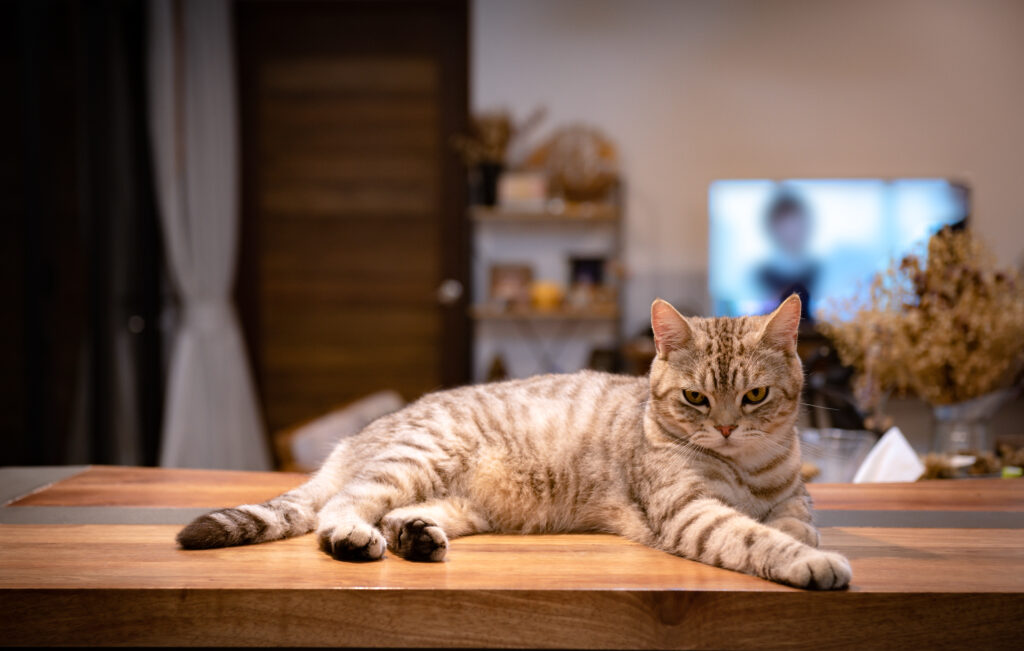
Ever caught your feline friend belting out a midnight meow-symphony? Well, the mystery behind it might just be boredom! Think of it like this: if you were a cat stuck indoors all day with not much excitement, you’d probably use the night to express your feelings too.
Contrary to the belief that cats are natural night-dwellers, they’re actually just looking for some action. When they don’t get enough playtime or mental stimulation during the day, they turn the night into their personal concert hall. Those meows are like their way of saying, “Hey, I’m feeling a bit bored here!” So, the next time your cat serenades you in the wee hours, it’s a signal that they’re craving more daytime adventures and fun.
They are Hungry
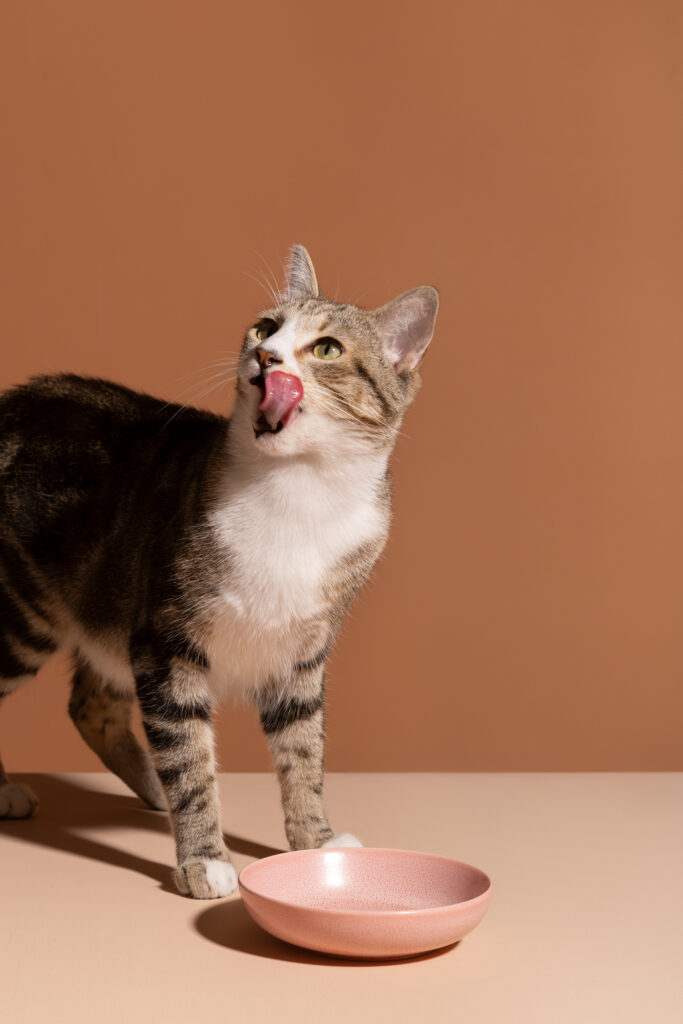
Hunger plays a significant role in the nocturnal serenades of cats. When a cat’s last meal of the day occurs early, their hungry stomach acts as an early-morning alarm clock, prompting a chorus of meows. Changes in the cat’s diet can also trigger these hunger-induced vocalizations, with a new eating routine leading to midnight requests for an encore serving. Maintaining a consistent mealtime routine and ensuring a balanced diet are crucial, as unpredictable meal schedules may result in disruptive nighttime meowing. Understanding and addressing these hunger-driven melodies can contribute to a more harmonious nighttime routine for cats and their owners.
Thyroid Issues
When your feline companion begins to serenade the night with persistent meows, thyroid issues might be playing a silent but significant role. Hyperthyroidism can be tricky to detect, especially common among senior cats. The hormonal imbalance triggered by thyroid issues fools your cat’s body into believing it needs more nourishment, leading to an increased appetite. This confusion extends beyond the dining bowl, causing your cat to call for assistance at night. Recognizing these subtle signs is crucial, as hormonal imbalances may indicate underlying conditions. A visit to the vet becomes essential for a comprehensive examination. Treatment options may include medication, iodine treatment, thyroid surgery, or a dietary adjustment tailored to cat thyroid issues.
Kidney Issues
Another potential culprit behind nighttime meows is kidney disease. If your cat’s nighttime serenades come accompanied by increased thirst, frequent urination, weight loss, decreased appetite, lack of energy, and altered grooming habits, kidney disease could be the underlying issue. While kidney disease is incurable, its progression can be slowed down. Ensuring your feline friend consumes a diet of wet food low in phosphorus and stays adequately hydrated through regular water intake becomes paramount. Regular veterinary check-ups play a crucial role in managing kidney issues and alleviating potential discomfort caused by restlessness, distress, or excessive vocalization. If your cat’s nighttime vocalizations become regular, consulting with a vet becomes a proactive step in safeguarding their health.
Pain
When your furry friend transforms the night into a symphony of meows, pain could be the silent orchestrator. Cats, masters at concealing discomfort, might vocalize their agony, serving as a crucial cue for cat owners to delve deeper into their well-being. Whether stemming from illness or injury, pain becomes a nocturnal muse for feline vocalization.
Cats may communicate pain or injuries through meowing, and their sleeping positions can also indicate potential illnesses. Explore our article on cats’ sleeping positions to understand your cat’s behavior better.
Aging: Cognitive Dysfunction
As cats grow older, they may experience a condition called Cognitive Dysfunction Syndrome (CDS), similar to dementia in humans. Typically occurring around the age of 10 or older, CDS can lead to various challenges for our feline friends. One common sign is nighttime vocalization, as the aging process affects their brain, causing confusion and a sense of being lost in the dark. Cats with cognitive dysfunction may express their confusion through nighttime cries, particularly when struggling with poor night vision.
Territorial Behavior
Cat owners may witness an intriguing yet usual occurrence in the moonlit hours – their cat’s nighttime meows, driven by instinctual territorial instincts. Naturally, protective cats use the night as a watchful period to alert against intruders, including other cats, creatures, or new human members. This behavior, termed caterwauling, entails intense yowls, indicating a cat’s claim over its territory. Occurring mainly at night, cats, being creatures active during these hours, stay extra alert for potential intruders.
Mating
Ever been startled by the mysterious and quite alarming sounds of your cat at night? Chances are, it’s not pain but the distinct call of mating. Cats, particularly those in heat (in oestrus), express their readiness to mate through a unique and sometimes startling vocalization. If your female kitten is crying at night, she may be in season, as cats can become sexually mature as early as four months of age. Entire male cats might also join the nocturnal symphony, crying out in search of a potential mate.
Outdoor Cats Feel Trapped Inside
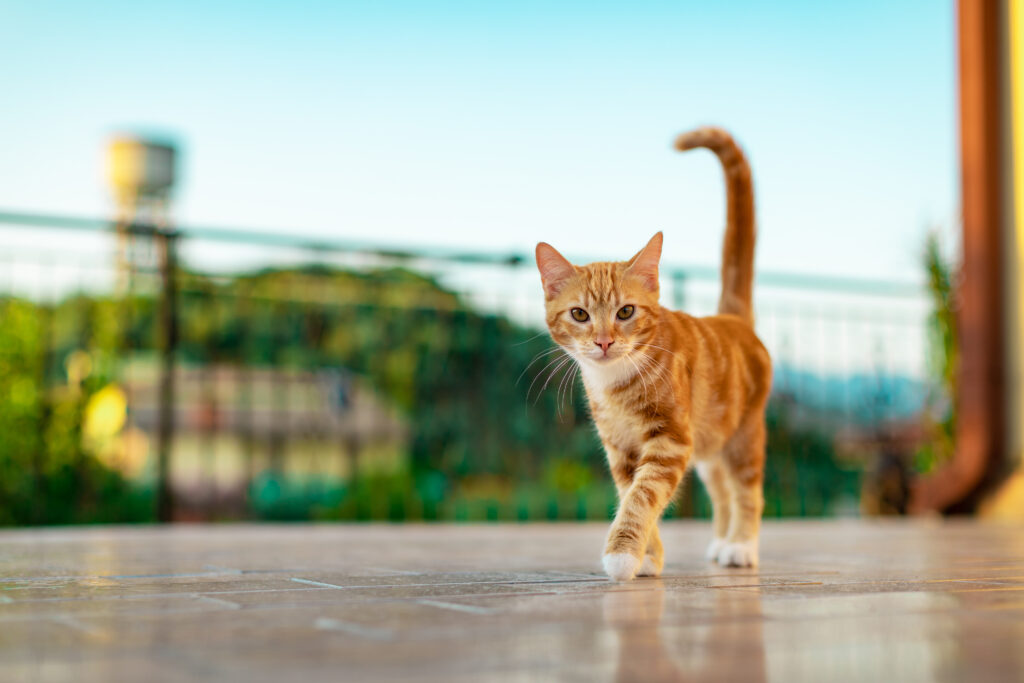
For cats used to outdoor freedom, staying indoors at night can make them feel trapped, resulting in unsettling meows that break the silence. This is common in cats roaming outdoors during the day but having to stay inside after sunset. The shift from open outdoor exploration to confined indoor spaces can prompt vocal expressions of frustration.
Changes of Environment
Transitioning to a new environment can trigger a nighttime chorus of meows from our feline friends. Cats, creatures of habit, tend to vocalize when faced with changes in their surroundings, whether it’s a shift in their territory’s layout or a move to a completely new home. The unfamiliarity can induce anxiety in our furry companions, especially during midnight meows, commonly observed in younger cats. These vocalizations go beyond boredom, often representing an expression of anxiety caused by alterations in their environment.
10 Tips to Stop Cats Meowing at Night
Visit the Veterinarian
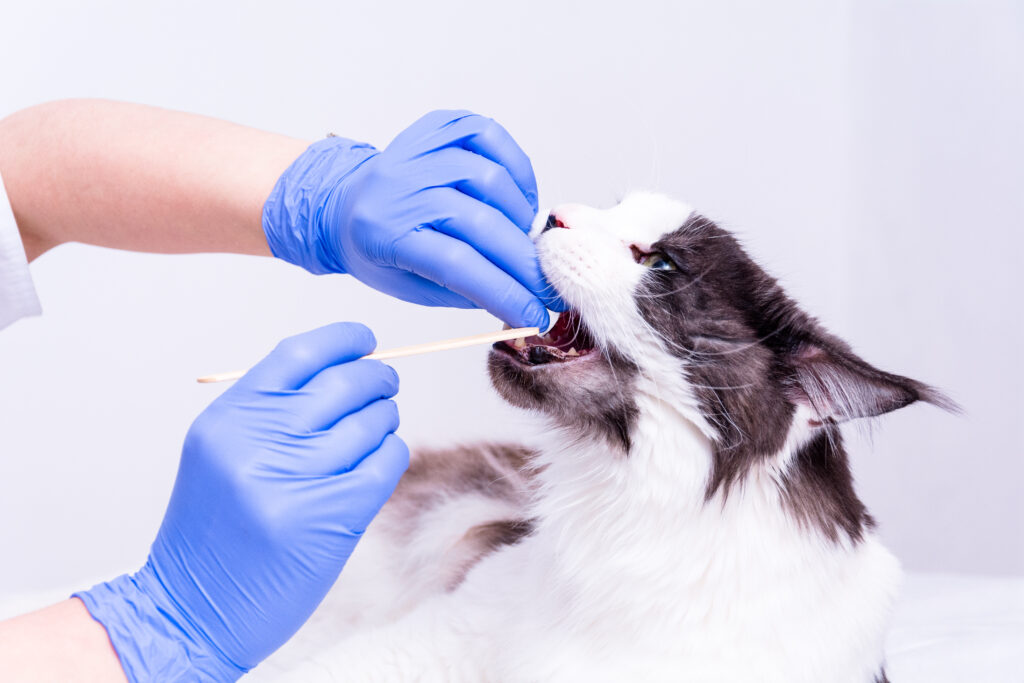
Decoding your cat’s nighttime meows begins with a vital step – a health check with your trusted vet. Recognizing the importance of ruling out health concerns before exploring other solutions, we, as pet enthusiasts, advocate for this crucial step. Especially for older cats, where persistent nighttime meows might signal underlying issues, a vet check-up is not just a suggestion but a strategic move. Soft or loud, increased meowing can hint at medical conditions like hyperthyroidism, unraveled by precise blood tests. The vet’s expertise helps with solutions like strategically placed night lights for senior feline friends with diminished senses. As advocates for feline well-being, we stress the role of vet appointments to ensure our cats enjoy healthy, harmonious lives, free from the enigma of nocturnal meowing.
Reset Your Cat’s Internal Body Clock
Creating a structured routine for feeding, playtime, and attention helps cats feel secure and relaxed. Incorporating a play session just before bedtime, followed by a portion of their evening meal, can contribute to a more peaceful night’s sleep. This consistent routine aids in resetting your cat’s internal clock, ensuring they expend excess energy in the evening, leading to a quieter and more restful night.
Keep Your Cat Awake and Busy During the Daytime
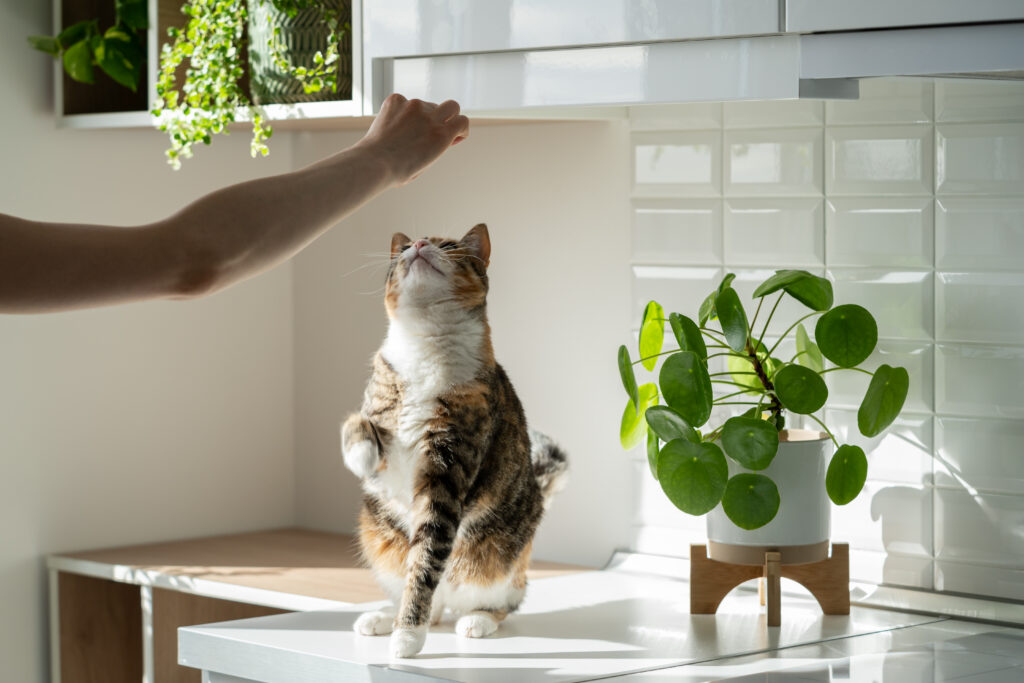
Enhance your cat’s daytime activity with a timed-feeder strategy, offering multiple-spaced meals to keep them alert and active. Introducing stimulating food puzzles, like the Aikiou Stimulo, adds mental challenges to mealtime. By prioritizing play and interaction during the evening, you prevent nighttime restlessness driven by boredom or loneliness. Recognizing your cat’s inherent predilections for dawn and dusk activity, this approach aligns with their natural rhythm, fostering a more peaceful night’s sleep for you and your feline friend.
Leave Food and Water Before Bed
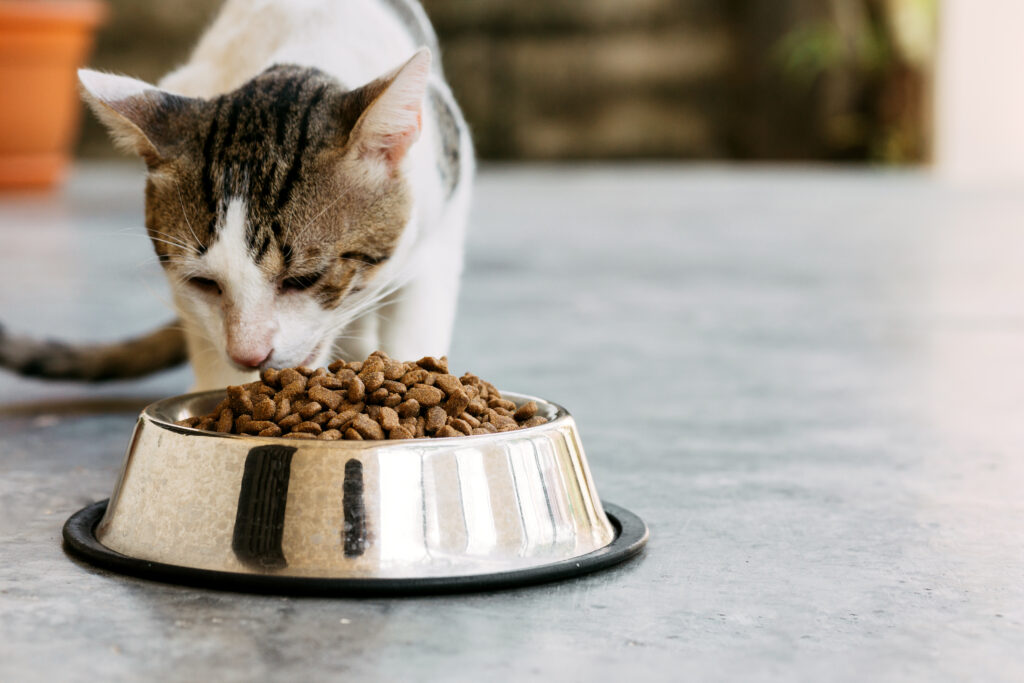
Tackle your cat’s nighttime vocalizations by adopting a simple pre-bedtime routine. Before you retire for the night, ensure your feline companion has access to dry cat food and water. This proactive approach caters to potential hunger or thirst, allowing your cat the freedom to snack and hydrate independently throughout the night.
Consider adjusting your cat’s feeding schedule, providing a meal just before bedtime to guarantee a nightlong supply of food and water. Balancing this with a healthy diet is crucial. Additionally, incorporating treats or concealing food toys around the house can keep your cat engaged and satisfied until morning. This thoughtful practice of leaving out food and water establishes a serene atmosphere, mitigating disruptive nighttime meowing for a harmonious sleep environment.
Ignore Your Cat’s Meow While You Are Sleeping
When your cat’s nighttime meows become a nightly performance, mastering the art of silence is the key. If medical issues are ruled out, and it’s a call for attention, the best response is often no response. Ignore the meows, resist the urge to engage, and let your cat learn that the nighttime serenade won’t yield the desired attention. It might take some patience, but consistency in not giving in will eventually lead to a quieter, more serene sleep environment for you and your feline friend.
Clean the Litter Boxes Before Bed
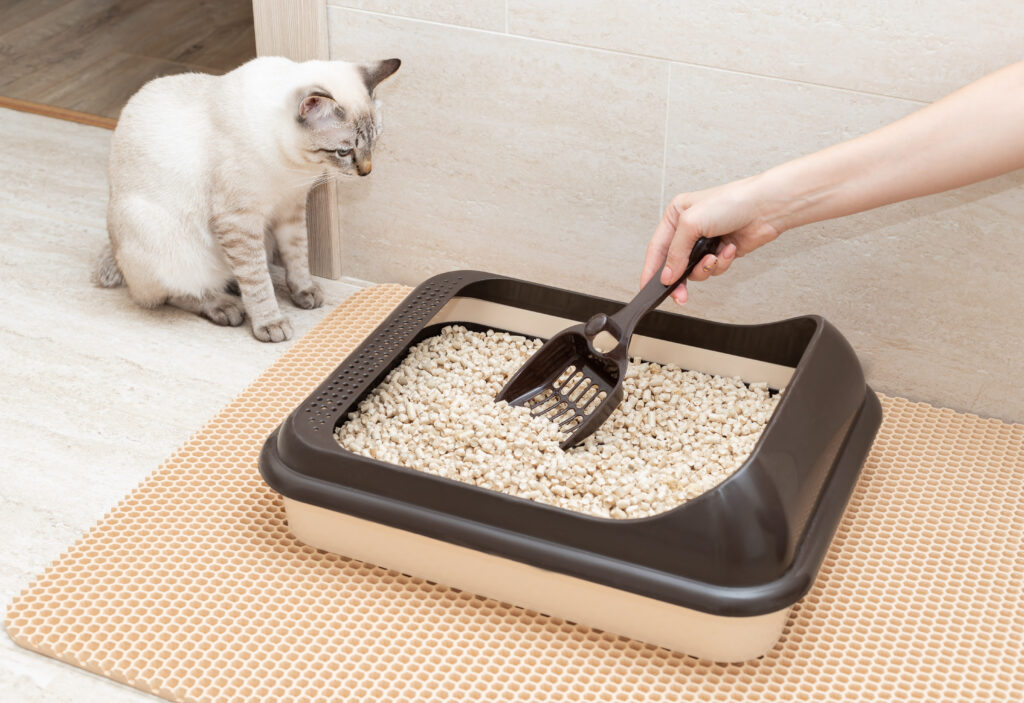
Understanding your cat’s need for cleanliness is crucial in deciphering the nighttime meow code. An unclean litterbox is a major offender, causing feline distress and nocturnal vocalizations. Cats, meticulous by nature, may protest against a soiled restroom, leading to disruptive behavior. To ensure a harmonious night’s sleep, we recommend adopting a routine of cleaning the litterbox before bedtime. This simple step not only aligns with your cat’s hygiene preferences but also reduces the chances of disruptive meowing, creating a serene sleep environment for you and your feline companion.
Establish a Secure Nighttime Setting for Older Cats
Nightlights play a pivotal role in assisting cats, especially those with dementia, by improving visibility in the dark. Cats experiencing cognitive decline may struggle to locate their essentials, making nightlights a valuable aid. Maintaining consistency in furniture placement also helps establish a routine, reducing confusion and disorientation for aging feline companions. These measures contribute to a peaceful coexistence during the night, ensuring that older cats feel secure and comfortable in their environment.
Spay or Neuter Your Cats
If your cat is meowing excessively due to being in heat, mating, or engaging in territorial conflicts, spaying or neutering is the solution you’ve been looking for. This straightforward surgical procedure not only addresses these behavioral issues but also brings additional health benefits, reducing the risk of reproductive cancers. For those with kittens, early intervention is crucial in preventing unwanted behaviors and ensuring a peaceful night’s sleep for both you and your feline friend.
Close the Curtains During Bedtime
To curb nighttime meowing, consider a straightforward strategy—keep those curtains drawn. Cats, with their innate curiosity, can get agitated by external factors like neighboring cats or unfamiliar sights. Closing the curtains helps shield them from external stimuli, reducing anxiety and minimizing the chances of restless meowing during the night. This simple adjustment fosters a calm indoor environment, ensuring your cat enjoys undisturbed sleep and granting you a quieter night.
Offer Various Cat Scratchers, Toys, or Cat Trees
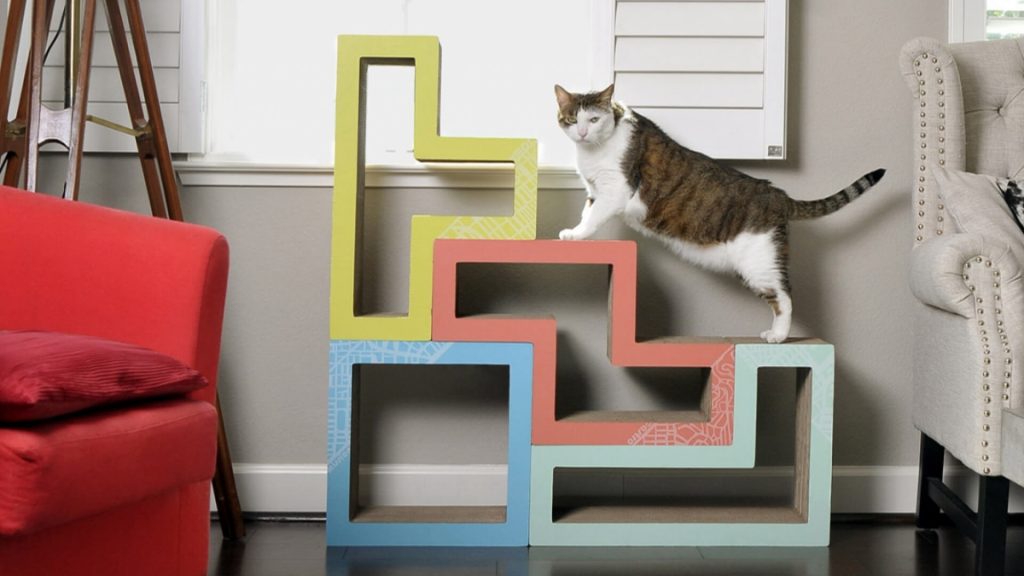
To make your cat’s nights more peaceful, here’s a simple trick – offer a variety of cat scratchers, toys, and cat trees. Creating a secure space with play options, scratching posts, and calming pheromones to navigate and lessen the intensity of territorial meows in the nighttime. Imagine it like a playtime buffet for your feline friend. And here’s the cool part: there’s a unique product called Katris Modular Cat Tree. It’s like Lego for cats, allowing you to build a personalized cat playground on your wall. This isn’t just about fun; it’s a design-friendly addition to your home. With Katris, your cat stays happily engaged, even during the night, thanks to integrated cat toys. Say goodbye to those mysterious meows and hello to a home where your cat can play and sleep in peace.
If you want to know more options for cat trees or furniture to engage your cats at home, check out our article about cat furniture.
Wrap-Up
Understanding the mysterious language of our cats’ nocturnal meows is key to fostering a peaceful sleep environment. This guide explores ten common reasons behind nighttime vocalizations, ranging from the cat’s natural body clock to health issues and territorial behavior. By deciphering these cues, cat owners can implement effective solutions for a tranquil night.
Practical tips for a serene sleep environment include regular vet check-ups, structured routines to reset the cat’s internal clock, and engaging daytime activities. Ensuring litterbox cleanliness, establishing secure nighttime settings with nightlights for older cats, and employing strategic curtain use contribute to a calm ambiance. To add an element of playfulness, offering diverse scratchers or toys and introducing innovative solutions like Katris Modular Car Trees creates a home where both cats and owners can enjoy undisrupted nights and harmonious living.
Don’t miss the chance to offer your cat this incredible experience. Visit our online store today and transform your pet’s relaxation routine with the Katris Modular Cat Tree.


